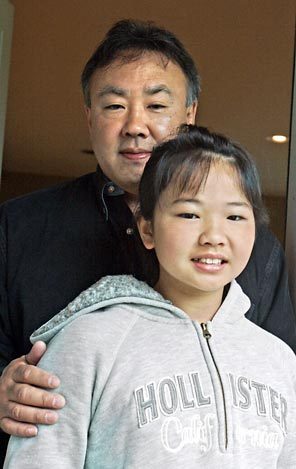Originally published Sunday, June 1, 2008 at 12:00 AM
Seattle parent of 4 says something important is missing when diversity decreases
When David Fukuhara graduated from Franklin High in 1975, that school had a nearly equal mix of black, Asian-American and white students...
When David Fukuhara graduated from Franklin High in 1975, that school had a nearly equal mix of black, Asian-American and white students. The school district had not yet started busing students to integrate schools, and he says Franklin's racial mix appeared to reflect the school's neighborhood.
At Franklin, Fukuhara made lifelong friendships with people of all colors, he said, and he strongly values that experience.
"It's helped establish relationships," he says, "whether friendships or business relationships. I'm comfortable working with a wide range of people."
He isn't sure what the School Board can do about the dwindling diversity at some schools, but he regrets that it's happened.
It's affected his own children, he says, and he must make a more concerted effort to teach the value of diversity at home.
When his oldest child entered school at McGilvra Elementary, the district was still busing some students to integrate schools.
He and his wife chose McGilvra primarily because it was close to his parents' house, and they wanted their children to go there after school. They also liked McGilvra's strong academic program. And, at the time, Fukuhara said, it had a "decent amount of diversity."
But with every child, he says, the school's minority population seemed to decline.
Now, his youngest daughter is one of just a few Asian Americans in her class, he said.
This year, he says, she came home crying, saying another student referred to her with a racial slur. It's something that he couldn't remember ever happening at McGilvra.
The principal dealt with the problem well, he said, and made it clear such behavior would not be tolerated.
But he can't help but think it wouldn't have happened if the diversity hadn't declined.
![]()
Without it, he said, "there's a lot less tolerance for differences in people."
It's not true for everyone, of course. His daughter's friends, he says, are white, "and they're all good kids, and their parents are good people."
"But as you get older," he added, "there are some who grow up without that kind of exposure and understanding."
In middle school, the Fukuharas decided on private schools in part because they wanted smaller class sizes. Now two of his children are back in public schools for high school. His oldest is at Garfield, where he says her experience comes closest to what he had at Franklin.
A lack of diversity is a problem no matter who's in the minority, he says.
"If there were all minorities and a few whites," he says, "I would be concerned about discrimination toward whites.
"I just feel as if more diversity ... generates more understanding among people."
Linda Shaw,
Seattle Times education reporter
Copyright © 2008 The Seattle Times Company
UPDATE - 10:51 PM
Seattle Public Schools name interim financial officer
Jerry Large: It's time to change Seattle schools superintendent's job
OMG! Text lingo appearing in schoolwork
STEM grants help attract more students to sciences
Former Seattle schools attorney reverses course, offers to talk with scandal investigator

general classifieds
Garage & estate salesFurniture & home furnishings
Electronics
just listed
More listings
POST A FREE LISTING



